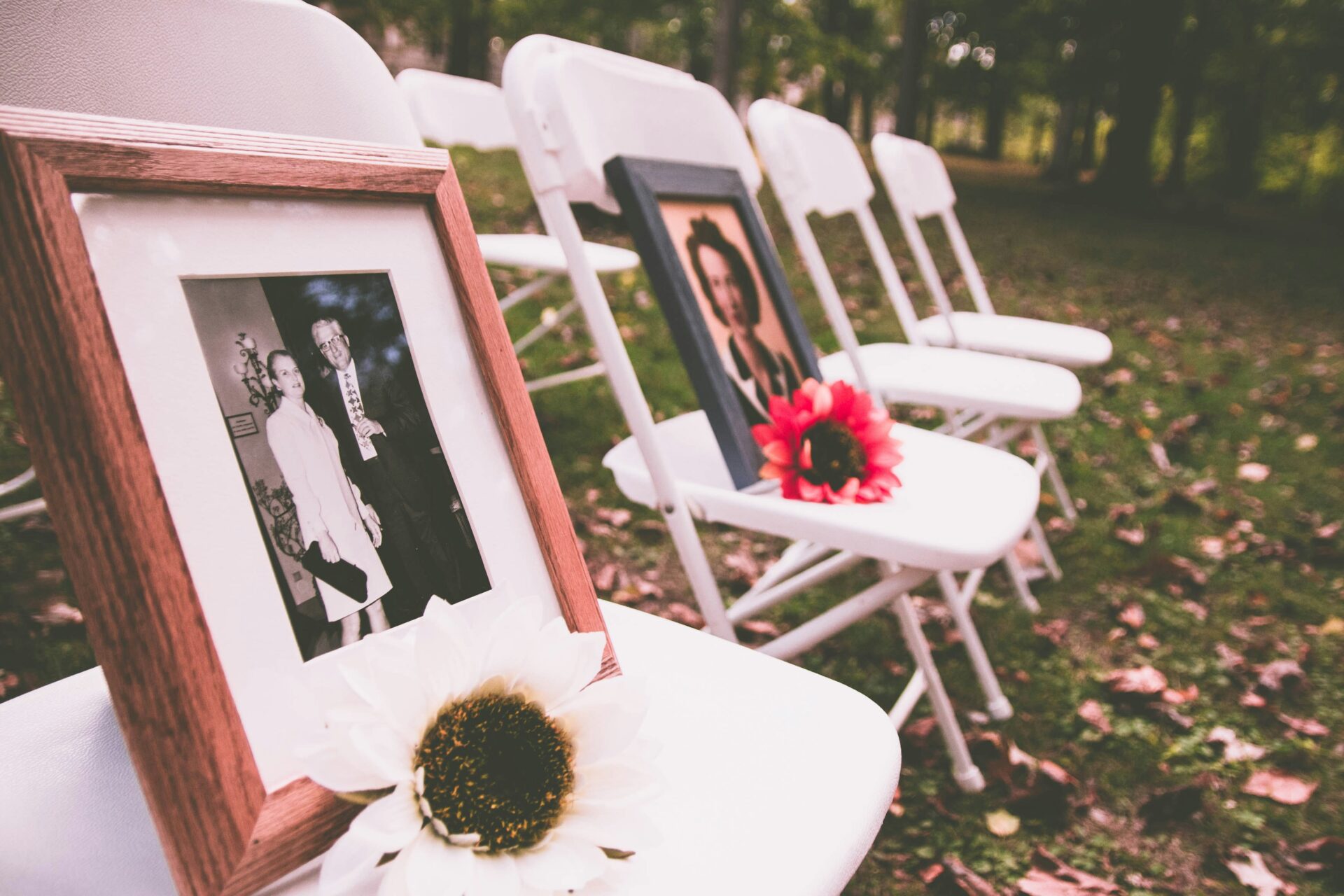
We may not be thinking of loss when we are thinking of weddings. In fact, weddings might be associated with the complete opposite – we are gaining a spouse, more family, and our celebration is big and full of additive things to our life! That being said, a wedding is also a marker of what we refer to in counseling as “a necessary loss.” A wedding is a milestone that, as it’s getting you to where you want to go, can sometimes include necessary losses we weren’t expecting. When we experience any kind of loss, we experience grief, which includes a wide range of emotions. When we mention or share about loss, the biggest one that people are well-aware of is the passing of someone we love. At AisleTalk, over the years, we’ve discovered and discussed more than one type of loss.
A couple of years ago, AisleTalk sat down with licensed marriage and family therapist, Marisa Patel to discuss how loss and grief impacts people during wedding planning. If you haven’t had a chance to watch our discussion, head on over to AisleTalk’s Instagram reels for a refresher.
In this blog, we’re going to revisit that discussion and capture the various kinds of loss that comes forward during wedding planning and how we can cope when they do. During wedding planning, it can become challenging to express other emotions aside from happiness. You can feel sad, regretful, scared, frustrated, and at high levels of stress, but not able to portray these emotions due to the expectation that you must be happy or stress-free. Feeling these emotions don’t necessarily mean that you aren’t happy about getting married or that you aren’t happy to be with your partner. What it means is we are human and during a major life transition, we can and will experience more than one emotion at a time, especially if we have many responsibilities and thoughts swirling in our minds.
What are different kinds of loss we can experience during wedding planning?
1. Loss of a Family Member or Loved One
For many brides and grooms, while they’re imagining their wedding day, they’re also imagining who won’t be present for this day. Clients have shared about missing a loved one even more during this period of planning. It can be challenging not to think: “What would my dad want here?” or “My grandmother would have really loved this.” It becomes difficult to even think about happiness when the person/people you want to celebrate with are no longer present in your life. With significant traditions like a father walking his daughter down the aisle or a special speech from an aunt or uncle, it can feel daunting to visualize what the day will look like without that special person.
2. Loss of Friendship
Friendship heartbreaks often hurt as much as romantic heartbreaks. Throughout wedding planning, while some people feel supported, others feel as though they are “doing it all alone.” They may not feel a strong sense of support from specific people who they expected to feel support from. Friendships also change through the years, so you might be asking yourself, “What does this person mean to my life right now? What did they mean before?” There can be shifts, even if a person is physically present in your life, and those shifts can feel vulnerable and scary. You might also be thinking about a past friend who is no longer in your life and wishing that they could be.
3. Loss of Identity
A common theme for our brides and grooms include their sense of self. This transition from being single to becoming engaged to married is a change that can feel as though it’s happening all too quickly. In the midst of planning a wedding, there’s no time or brainspace to dedicate to thinking about our identity shifts! For couples who have been dating for a long time or even living together prior to their engagement, at first, it may not feel like a big change. There can be a sadness that comes with letting go of a previous life without a partner, or a sadness that major changes will occur in the future, including a reprioritization of time and energy. Thoughts and questions may come up, such as not wanting to upset future in-laws, who do we spend holidays with, and/or what are new routines going to look like? In these moments, it becomes incredibly difficult to focus on the present when your mind may be wandering in the past or future.
With identity, we also think about gender norms. Men are encouraged to be independent and separate from their parents at any early age, while women are encouraged to maintain close ties and focus on relationships as a priority in life. For specific cultures, women are told that they must maintain relationships with their “new family” and not so much with their family of origin. In marriage, men often feel that they are gaining something, while women feel that they are losing a part of their identity. Marriage can then be seen as an obligation or duty instead of a choice.
4. Loss of Life Outside of Planning
Our clients bring forward how much time, effort, and energy they have to dedicate to wedding planning on a daily basis, including during and after work hours. When so much of wedding planning becomes consuming, people experience exhaustion, burnout, and may start to unintentionally neglect their life outside of planning. This can mean you no longer get to do the fun activities that bring you joy, you no longer have time to see your friends over the weekends, and you are unable to focus on any responsibilities outside of wedding tasks. There’s less spontaneity and more pressure to be productive with your time.
5. General Ambiguous Loss
A challenging aspect of loss is when we experience ambiguous loss – this can often mean having an experience that can feel undefined, unclear, and without a clear sense of closure. This can include unmet expectations of how wedding planning is going, how your wedding day turns out, and not feeling as emotionally connected to the day. Sometimes, this type of loss feels unexplainable or not as tangible; we might feel sad and scared, and may not fully understand why. When our vision of the day is not aligning with our reality, we can start to feel a loss of control and it can become tough to adapt to what is right in front of us.
What are strategies we can use to manage our loss?
1. Allow yourself intentional time to sit in discomfort.
Grief is uncomfortable, it does not make us feel good, and a lot of us would rather bottle these emotions because it feels easier to do so. Although every time may not feel appropriate to share your grief or you may not want to share with everyone, it can feel cathartic to acknowledge your grief. This can look like giving yourself time to cry, taking a break from work, and/or journaling your feelings. AisleTalk’s clinical intern, Taylor speaks about lovingly managing our emotions in a previous blog.
2. Honor your loss by incorporating the person you’ve lost in your wedding in a way that feels meaningful for you.
Some examples include: having photos of your loved one(s) at a dedicated table, creating a memory book/box, making a donation in their name, including them in your personal vows or speeches, including their favorite music in the wedding playlist, giving your guests a custom-made keepsake that is connected to your loved one, and/or wearing/carrying an item that belonged to them. You can use your family’s support to brainstorm ideas or figure out what it means to honor this person you love and care about.

3. Pause on grief for a period of time.
This does not mean ignore or minimize your emotions, rather we understand that experiencing grief, while managing all the wedding tasks and responsibilities can be plenty at once. If it’s not possible to grieve during the planning, you can carve out intentional time to process your grief after the wedding. This can be with family, friends, and/or your therapist. In the meanwhile, you can use tools that soothe you, such as what you do for temporary self-care.
4. Take mental note of what you are feeling and thinking during the wedding planning.
If you cannot dedicate time to feeling all of the emotions, it could be helpful to note these emotions and process them at a later time. Similar to pausing on grief, you can take time afterwards to reflect on what was coming up for you. Were there unmet expectations? Did you feel disappointed by someone or something? How do you want to address this?
5. Use your support network and community.
Wedding planning can be an opportunity to communicate your needs, expectations, and delegate tasks. Community can vary for every person, it can include your partner, your parents or siblings, extended family members, close friends, colleagues/work friends, mentors, religious or community leaders, neighbors, and of course, your individual or couples therapist.
I often emphasize in my sessions that grief is collective and it is meant to be shared. No one should have to experience and navigate loss on their own. We can allow ourselves to feel disappointed, sad, and disheartened, even during one of the most important times of our lives.
At AisleTalk, we cover all of the above when it comes to wedding planning and navigating any kind of loss. Our therapists are here for you to support all of the emotions and identify what you need from those around you. Book a call with us today to learn more about how we can support you during this major life transition!

